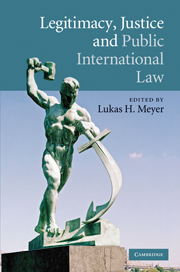Book contents
- Frontmatter
- Contents
- List of contributors
- Acknowledgements
- Introduction: Legitimacy, justice and public international law. Three perspectives on the debate
- 1 The legitimacy of global governance institutions
- 2 Institutionalising global demoi-cracy
- 3 The responsibilities and legitimacy of economic international institutions
- 4 Do international organisations play favourites? An impartialist account
- 5 ‘Victors’ justice'? Historic injustice and the legitimacy of international law
- 6 International law and global justice
- 7 Global justice: Problems of a cosmopolitan account
- 8 The responsibility to protect human rights
- 9 The threat of violence and of new military force as a challenge to international public law
- 10 Forcing a people to be free
- Index
- References
1 - The legitimacy of global governance institutions
Published online by Cambridge University Press: 03 May 2010
- Frontmatter
- Contents
- List of contributors
- Acknowledgements
- Introduction: Legitimacy, justice and public international law. Three perspectives on the debate
- 1 The legitimacy of global governance institutions
- 2 Institutionalising global demoi-cracy
- 3 The responsibilities and legitimacy of economic international institutions
- 4 Do international organisations play favourites? An impartialist account
- 5 ‘Victors’ justice'? Historic injustice and the legitimacy of international law
- 6 International law and global justice
- 7 Global justice: Problems of a cosmopolitan account
- 8 The responsibility to protect human rights
- 9 The threat of violence and of new military force as a challenge to international public law
- 10 Forcing a people to be free
- Index
- References
Summary
An institution is legitimate in the normative sense if it has the right to rule – where ruling includes promulgating rules and attempting to secure compliance with them by attaching costs to non-compliance and/or benefits to compliance. An institution is legitimate in the sociological sense when it is widely believed to have the right to rule. When people disagree over whether the WTO is legitimate, the disagreement is typically normative. They are not disagreeing about whether they or others believe that this institution has the right to rule; they are disagreeing about whether it has the right to rule. This chapter focuses on legitimacy in the normative sense.
We articulate a global public standard for the normative legitimacy of global governance institutions – henceforth GGIs, for brevity. This standard can provide the basis for principled criticism of GGIs and guide reform efforts in circumstances in which people disagree deeply about the demands of global justice and the role that GGIs should play in meeting them. We stake out a middle ground between an increasingly discredited conception of legitimacy that conflates legitimacy with international legality understood as state consent, on the one hand, and the unrealistic view that legitimacy for these institutions requires the same democratic standards that are now applied to states, on the other.
Our approach to the problem of legitimacy integrates conceptual analysis and moral reasoning with an appreciation of the fact that GGIs are novel, still evolving, and characterised by reasonable disagreement about what their proper goals are and what standards of justice they should meet.
- Type
- Chapter
- Information
- Legitimacy, Justice and Public International Law , pp. 29 - 57Publisher: Cambridge University PressPrint publication year: 2009
References
- 9
- Cited by

